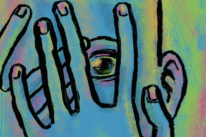
“We must each lead a way of life with self-awareness and compassion, to do as much as we can. Then, whatever happens we will have no regrets.” ~Dalai Lama
If you’re anything like me, you may have a love-hate relationship with social networking.
There are so many cool facets to social networking sites, such as Facebook, but I am finding that the relative ease of information sharing with the masses and portable nature of technology bring their own set of challenges. Not a bad thing, per-se, but perhaps an invitation to practice even greater mindfulness and compassion.
Consider the title “FACEbook”
Jungian psychology describes the journey of the self through personal individuation. It’s a path of learning how to better understand and shed aspects of our persona—the “mask” or public face we use to make an impression on others, while potentially concealing parts of our true nature—as we work toward integrating a more holistic and genuine self-presence in our world.
The hope is that in coming to better understand our multi-faceted selves (desired and undesired aspects), we come to realize that while we are unique, we are also very alike in our fears, our longings, our hopes, and desires.
In other words, after all our all our striving to be someone, we eventually learn to relax into who we are in our shared humanity, which is broken and beautiful.
Facebook has been both my friend and enemy throughout the past year and a half, as I have struggled to recover from surgery after surgery due to traumatic injuries suffered in a climbing fall in November of 2012.
Mindfulness practice is something I have chosen to embrace as part of my recovering journey. I am finding that as I come to better understand my own feelings in relation to pain and struggle, loss and gain, ability and disability, and despair and hope, I am comforted by the realization that these are the things I share with all human beings.
Awareness
I think I am not unique in the sense that, by nature, I tend to compare myself to other people. The society we live in encourages the competitive spirit—the edge that somehow sets one apart as “better” or “more deserving” of praise, affirmation, or whatever.
We are proud of our accomplishments, our abilities, our attractiveness, or the things we believe define us. The feelings that arise with these qualities are good, even though they are fleeting.
But what happens to our spirit, or our psychic energy, when we are faced with loss of ability, loss of attractiveness, or loss of what has typically brought us happiness and fulfillment?
When we are faced with any type of emotional experience, Facebook can provide a fertile opportunity for composting those feelings, or churning them around in our psyche.
These feelings can serve as a reminder to have compassion with ourselves.
For a period of time, I found that I needed to limit my interaction with Facebook, as the postings of others seemed to really magnify the pain and losses I was feeling.
Seemingly “perfect” lives appeared to reach out from my computer screen to punch me in the face. I was consumed with my own personal misery—my scars, my disabling injuries, and my frustration with how limited my life had become, as well as my uncertain future.
My initial reaction to these feelings was to feel really bad and guilty, and to minimize my own experience.
As my mindfulness practice evolved, however, I was able to create maitri, or unconditional self-acceptance as a part of my healing journey. To be able to tell myself “yes, your life does suck right now, and it is okay to mourn your abilities, your hopes, and dreams” was incredibly liberating.
Since then, I have taken dozens of vacations from Facebook, and I return when I am ready.
The feelings we experience as a result of social networking can also serve as a reminder that we are not alone. They are shared by all human beings.
The Buddhist concept of Big Mind indicates an awareness of reality that transcends the merely personal, into the collective reality of all humankind.
Have I ever felt proud of my abilities and my appearance? Absolutely. Have I felt the desire to share my joy in accomplishment or circumstance with others collectively? Of course. These are awesome feelings, and they teach us the value of gratitude.
But I am acutely aware that there are folks out in Facebook-land who are also faced with struggles and challenges, and that whatever I post may engender a variety of responses or feelings in people with varying life circumstances.
Mindful Compassionate Posting
With every post, I try to be mindful of feelings and personal reactions. I ask myself these questions:
What is my reason for posting this?
Is it because I want to share what is happening in my life, to communicate good or helpful information, or a positive message?
By my posting this, I obviously have some kind of expectation of others reading it (otherwise, why would I post?). How will I feel if the comments or feedback (or lack of them) are not what I had hoped for?
Am I posting this because of some kind of validation that I need, or can I let go of the expectations that I might have?
If I am posting to share good news (new job, achievement, marriage, children photos, etc.): Am I aware that my posting could bring up feelings of loss or pain in others?
I know that every day, people are faced with job-loss, acquired disability, divorce, or inability to legally marry, infertility, and other losses of hopes and dreams.
If I am posting to share news that is difficult, again, what are my expectations?
To be encouraged? To simply share information? Am I willing to not take things personally, understanding that sometimes the written word is not adequate to share or respond to some things.
It is unrealistic to think that in an age of widespread mass-communication, we can circumvent certain challenges and difficulties.
But we can become more aware of our reactions and compassionate in our interactions.
We can learn to brace ourselves for a variety of emotions when exposed to a huge diversity of experiences—all of which are relative and changing, and utilize Facebook and social networking as tools for cultivating greater loving-kindness toward ourselves and all beings.
Photo by geralt
About Chris PM
Chris has worked professionally in the fields of human services, retreat work, and ministry for over twenty years, and is presently using her education and experience as a trauma survivor to reach out to others on similar healing journeys. She is also a writer, and mom to two children—one with special needs.













 Though I run this site, it is not mine. It's ours. It's not about me. It's about us. Your stories and your wisdom are just as meaningful as mine.
Though I run this site, it is not mine. It's ours. It's not about me. It's about us. Your stories and your wisdom are just as meaningful as mine.